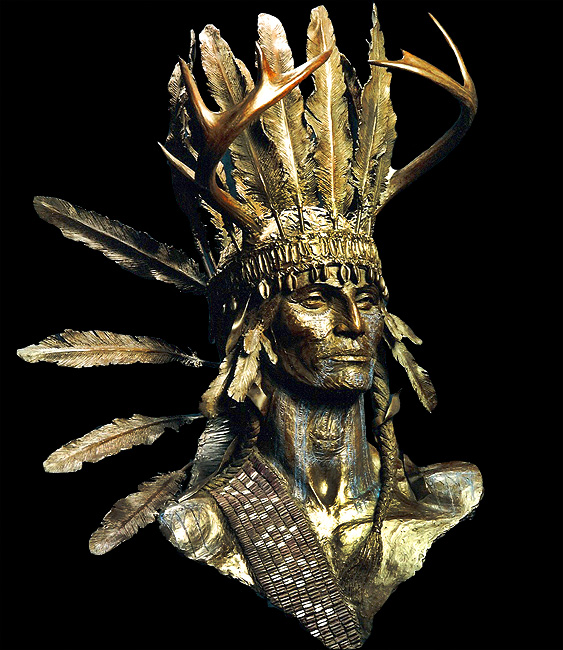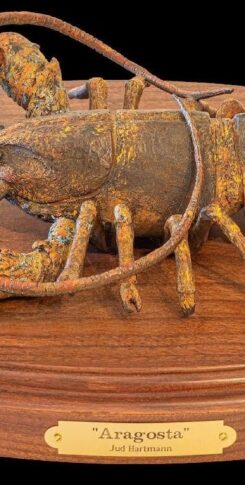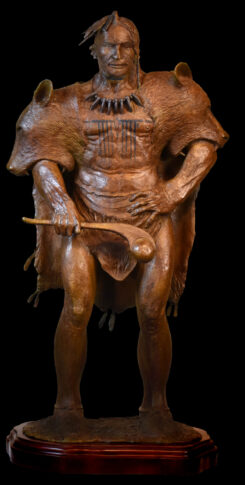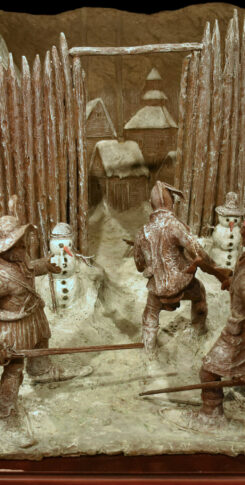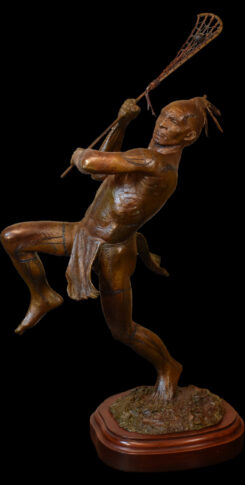Bronze edition: 20 | Height: 34″
“On the 5th of July, 1645, the Iroquois reappeared at Three Rivers (Quebec), bringing with them two men of renown, ambassadors of the Mohawk Nation. The chief of the Iroquois was Kiosaeton of impressive size and symmetry. Standing erect in the prow of the French sailboat that had brought him and his companions from the Richelieu, he was covered from head to foot in belts of wampum and announced in a commanding voice that he was the accredited envoy of all his nation. Among those on shore, his appearance was cause for great celebration and from the fort cannons were fired as a sign of rejoicing.”
Fr. Vimont, 1645
When the ambassadors had landed the Sieur de Chanflour gave them a very cordial reception. After they had eaten and smoked, Kiotsaeton, who was always the spokesman, said to all the French who surrounded him, “I find much pleasure in your houses. Since I have set foot in your country, I have observed nothing but rejoicing. I see very well that He who is in the sky wishes to bring to a conclusion a very important matter. The minds and thoughts of men are too diverse to fall into accord; it is the sky who will combine all.”
The Sieur de Chanflour who treated them very well, one day said to them that they were with us as if in their own country; that they had nothing to fear, as if they were in their own house. Kiotsaeton replied to this compliment by a very well-pointed and neat retort. “I beg thee,” he said to the interpreter, “to say to the captain who speaks to us that he lies.” And thereupon he paused a little to let the wonder grow. Then he added: “That captain tells me that I am here as if in my own country. That is very far from the truth. I would be neither honored nor treated with such consideration in my own country, while here everyone honors me and pays me attention. He says that I am as if in my own house; that is a falsehood, for I am sometimes maltreated in my own house, and here I fare well every day and am continually feasting. Therefore I am not as if I were in my own country or in my own house.” He indulged in many other repartees which clearly showed that he was a man of espirit.
Fr. Vimont, 1645
“We have many war songs in my country but we have cast them all away and now we sing of nothing but gladness and rejoicing.”
The ambassadors were entertained and feasted for a week and then the Grand Peace Council began. Along with the French and the Iroquois delegation were also representatives of the Huron and various Algonquin and Montagnais bands. “When all was ready Kiotsaeton arose, strode into the open space and raising his tall figure erect, stood looking for a moment at the sun. Then he gazed around on the assembly, took a wampum belt in his hand and began: “Onontio,* give ear. I am the mouth of all my nation. When you listen to me you listen to all the Iroquois. There is no evil in my heart. My song is a song of peace. We have many war songs in my country but we have cast them all away and now we sing of nothing but gladness and rejoicing.” With this he gave the first wampum belt to confirm his words.
On the eve of embarking for his own country, Kiotsaeton thanked them very wittily: “When I left my country, I gave up my life and exposed myself to death so that I am indebted to you for still being alive. I thank you that I still see the sun; I thank you for having received me well and for treating me well. I thank you for all the good conclusions to which you have come; all your words are very acceptable to us. I thank you for your presents; you have covered us from head to foot. Only our mouth remained free and you have now filled it with a fine calumet and gladdened it with the flavor of the plant that is pleasing to us. I therefore bid you adieu, but not for long; you will soon hear from us. Even if we are wrecked in the waters, I think that the elements will bear witness to our countrymen of your kind deeds and I am convinced that some good genius has gone before us and that our countrymen already have a foretaste of the good news that we are going to bring them.”
Fr. Vimont, 1645
* literally “Great Mountain” Iroquois term for all French governors derived from the 2nd Canadian governor, Montmagny.
See also The Envoy of Peace.

